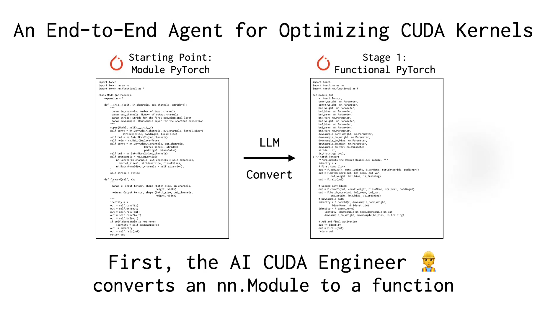Japanese AI startup Sakana AI has announced the launch of the "AI CUDA Engineer," an innovative AI agent system designed to automate the production of highly optimized CUDA kernels, significantly enhancing the efficiency of machine learning operations. According to the latest news on platform X, this system utilizes an evolved large language model (LLM) to drive code optimization techniques, increasing the execution speed of common PyTorch operations by 10 to 100 times, marking a significant breakthrough in AI technology for GPU performance optimization.
Sakana AI states that CUDA kernels, as the core of GPU computing, typically require deep expertise and a high technical barrier for direct writing and optimization. Existing frameworks like PyTorch, while user-friendly, often cannot match the performance of manually optimized kernels. The "AI CUDA Engineer" addresses this challenge through an intelligent workflow: it not only automatically converts PyTorch code into efficient CUDA kernels but also performs performance tuning using evolutionary algorithms, and can even integrate multiple kernels to further enhance runtime efficiency.

X user @shao__meng likened this technology to "equipping AI development with an automatic transmission," allowing ordinary code to "automatically upgrade to race car-level performance." Another user @FinanceYF5 also pointed out in a post that the launch of this system showcases the potential for AI self-optimization, which could lead to revolutionary improvements in the efficiency of future computing resource usage.
Sakana AI has previously gained recognition in the industry with projects like "AI Scientist," and the release of the "AI CUDA Engineer" further highlights its ambitions in the field of AI automation. The company claims that the system has successfully generated and validated over 17,000 CUDA kernels, covering a variety of PyTorch operations, and the publicly available dataset will provide valuable resources for researchers and developers. Industry insiders believe this technology not only lowers the barrier for high-performance GPU programming but could also elevate the efficiency of training and deploying AI models to new heights.
Information reference: https://x.com/FinanceYF5/status/1892856847780237318
